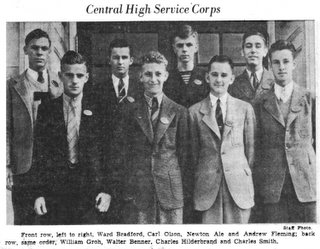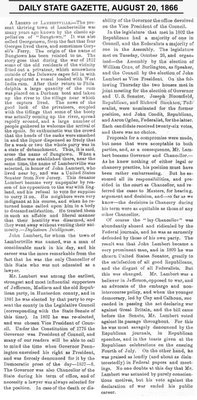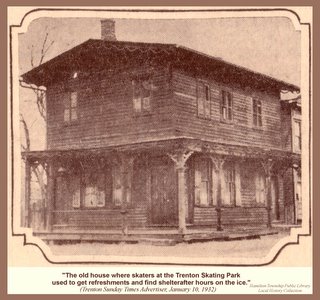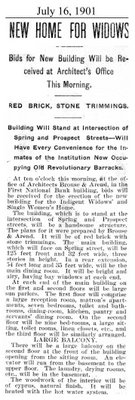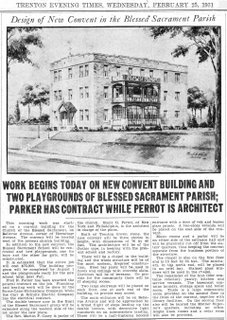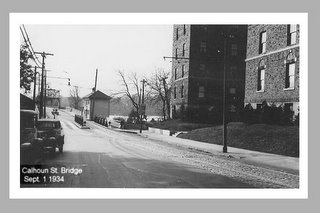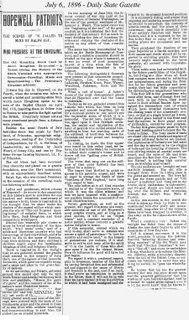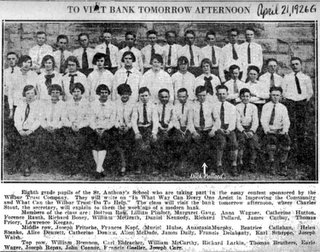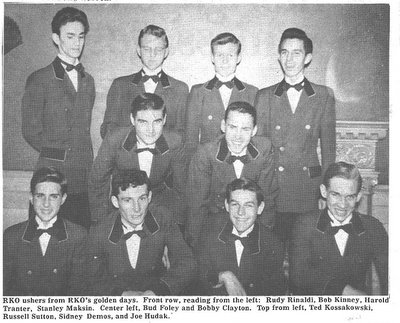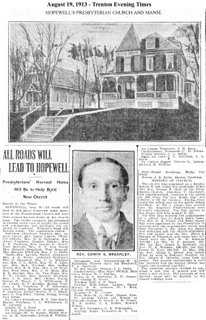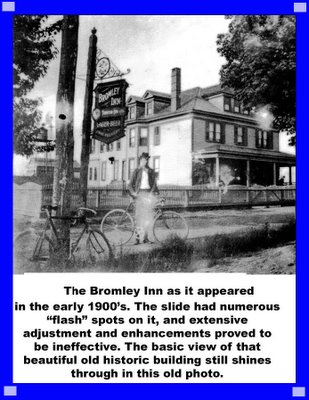Pages
Friday, December 30, 2005
Thursday, December 29, 2005
1946 - Trenton Central High School
Wednesday, December 28, 2005
1894: MULLEN'S HOTEL - TRENTON
During the 1800's there were many hotels in the city of Trenton. The graphic here shows one of the lesser known hotels.
Monday, December 26, 2005
1866: The Legend of Lambertville
Did you know that Lambertville was once known as "Bungtown?" It took a man by the name of John Lambert to change the name to the Lambertville we all know and love.
1877: Centennial of the Battle of Princeton
A Reminder From Tom
Enjoy!
The Skating Park on Bellevue Avenue
Sunday, December 25, 2005
1937: HOMEDELL SCHOOL SAFETY PATROL
Do you remember
THE KEYSTONE AUTOMOBILE CLUB
SAFTEY PATROL?
Here's a photo of the Homedell School patrol from 1937
Saturday, December 24, 2005
1883: Trenton Police in Sad Shape
WEDNESDAY, AUGUST 29, 1883
DAILY STATE GAZETTE
“Well, what shall I do?” the gentleman inquired.
“Go down to the Fifth Ward; you will find an officer there,” was the reply.
Later, another man reported at the station that there were vagrants gathered near his house on West State Street. He wished to disperse them. The officer on reserve informed this complainant that he could not leave the station; that there were no officers to spare just then, that he (the complainant) must find the man on duty in the Second Ward.
Tribute to my Alma Mater
It stands there now, as it has stood, for lo, these many years.
A childhood friend, whose inner rooms have witnessed joy and tears.
Miss Kelly's room, just as it was, some fifty years ago,
The wooden floors, the large green doors, kids walking to and fro.
I close my eyes, and realize, it hasn't changed that much.
There's still the love and caring, there's still the small town touch.
And as I dream, I see a lad He looks a lot like me.
His touseled hair, and patched up pants, Were common things to see.
My dream persists, and I perceive, as I move down the hall,
The smell of Kuser hallways, new teachers in the fall.
And as I dream, they all appear, like flowers in a row.
The teachers that I had back then, who helped us learn and grow.
We came in here mere toddlers, still wet behind the ears.
But, Oh! time flies, we grow so fast, what happened to the years?
It's true, we don't know what we have, we won't until it's past.
It's sad, but true, we never see, that time moves by so fast.
To those of you now learning here, within these friendly walls,
Live every day as if the last, before adulthood calls.
And when that day in June arrives, the time to say goodbye,
Think back to all the friends you had, a tear will fill your eye.
And as for you, dear Kuser School, they've thought enough of you,
To paint, restore, and dress you up, you still have work to do!
Tom Glover Class of '47
One really has to have a great affection for his school days if it inspires him to wax poetic. I do have that affection, and I did write the poem above to remember my wonderful years as a student in Hamilton's Kuser School. With just a bit of juxtaposition, you can use this poem to wax poetic about your own grammar school. The graphic is extracted from one of my many columns under the title, "Kuser School Diary." ......bittersweet memories!
Friday, December 23, 2005
1901: Plans for the Widows' and Single Womens' Home
Thursday, December 22, 2005
1914: St.James. P.E. Church
Today it's the Rehoboth Church on E. StateStreet near Garfield Avenue.
It is the original home of St. James P.E. Church, which ultimately moved to South Logan and Greenwood Avenues, and is in its latest and newest beautiful quarters down in the Yardville Allentown area.
Interesting notes about 1893 Trenton
* There are 4 to 6 girls to every man on the street. Trenton men are not matrimonially inclined.
* The town has two breweries, and another is in the planning stage.
* Hangings only take place at intervals of 40 years. The last hanging took place in 1863.
* There are 6 all night saloons.
* There are 45 weather vanes in the city. The only silent and lazy one is on top of city hall. * Street cleaning is not a fine art yet, but will be in the year 2000.
* Standing in the center of Warren and State Streets, 12 drinking places can be seen; however, this section of Trenton is the dryest neighborhood in the city. * There are only 2 building and loan associations in one of the busiest industrial towns in the state. Only 2 savings banks. The workingmen are not as thrifty as they could be. * The great center for wet groceries is on South Broad Street. Eleven drinking places are to located between Front and Livingston Streets.
* The population is 15,458.
* There are 366 drinking places, or an average of one for every 33 males.
* Male voters: 13,900, based on the presidential election of 1892. The average beer glass counts 3 to the quart. One half of the dealers water their whiskey. Over a third of them stay open on Sunday. There are 56 police patrolmen.
* There are 63 houses of ill-repute, one for every 200 male voters. They sell both hard and soft stuff. Twenty have licenses; the rest risk being caught.
* There are 12 regular poker rooms where card games are played night and day.
* There are 20 clubs of all kinds, where poker is played for money.
* There are 2 men to every 3 women who attend church. The best attendance of men is in the Presbyterian church. The Catholic faith is the strongest denomination in the city.
* It costs $3.00 to get drunk for fun.
* There are 93 bridges of all kinds; more waterways than any other town in the state, and fewer drownings.
Wednesday, December 21, 2005
Millham in 1886 - Fantastic Real Estate Opportunities!
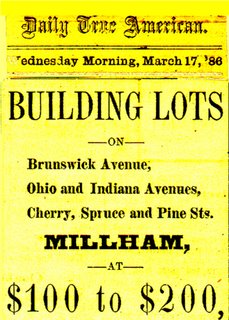
Today, this area of "Millham" is known as the area where Polish immigrants settled. The area also includes the Breunig, St. Joes Avenue area. According to a news item buried somewhere deep in my files, the Breunig area was settled by English pottery workers who designed the neighbord with homes situated in the same manner as their homes in Great Britain.
Tuesday, December 20, 2005
1931: New Convent for Blessed Sacrament Parish
Monday, December 19, 2005
Trenton in Bygone Days - McCully Pottery
1904: Sending Money to the Old Country
 The story of the Italians and most immigrants from the early part of the 20th century is a story of a fierce desire to become viable naturalized American citizens. After a very hard day of labor, many in the Italian community spent evening hours in night school learning the English language. Today, night school English classes seem to be a rare occurrance.
The story of the Italians and most immigrants from the early part of the 20th century is a story of a fierce desire to become viable naturalized American citizens. After a very hard day of labor, many in the Italian community spent evening hours in night school learning the English language. Today, night school English classes seem to be a rare occurrance.
"What the Negro is Doing"
Trenton Police Field Day
Trenton Catholic - 1944
Saturday, December 17, 2005
Proposed Perry Street Terminal - 1923
This is an architectural rendering of the proposed terminal. The actual building is somewhat different from the original plan. The building is still standing on Perry Street.
Click on the image, click on the lower right icon when it appears.
Hamilton's Bud Foley Remembers
 Bud Foley Remembers his days as an usher: Do you remember the RKO theatre chain? Do YOU remember what the letters "RKO" stood for? R" for Radio, "K" for Kieth's, and "O” for Orpheum---right? How about these delicious nostalgia tidbits from yesterday: Do you remember walking into the entrance to one of the many Plush RKO theatres and walking on those thick rugs in the lobby? ….Those maroon, velvet-covered ropes they string up between those chrome-plated poles? …..The "one-sheets" (big, colored movie posters) which lined the walls of the entrance to the theatre? …..The concession stand with the delightful aroma of buttered pop corn?.....Buying "Milk Duds," “Jujy Fruits," “Indian Nuts,” and how much better they tasted when you ate them while watching a movie?.... Remember sliding your admission (25c) under that little half moon shaped glass and how the ticket came out of that little slot ...a few mechanical "clicks" and out slid your ticket onto the stainless steed counter top. Taking that ticket and surrendering it to a smartly uniformed gentleman who represented the ultimate authority? He was an usher; impeccably dressed in a stiffly starched white collar, a bow tie, a blazing red jacket with black collar trim, and jet black trousers with a contrasting stripe up either side of his trouser leg. Hamilton’s Francis ("Bud ") Foley recalls his days as an usher in the RKO chain of theatres here in Trenton. Bud's reminiscences will be familiar to many visitors to this site. So return with us now to the year 1947. Here's Bud Foley: During the years of 1947 to 1949 when the movie house era was at its peak, some local gentlemen, including myself, were employed as ushers for the RKO theatres. To name a few: the Lincoln, Trent, Capitol, State, Palace, and Broad. Our starting pay was 60 cents an hour, and as a student, the hours were from 6 to 10 p.m. Monday through Friday, noon to 10 p.m. on Saturdays, Sundays, and holidays. Neatness was a prerequisite of the usher's job. Prior to receiving an assignment, each of us was required to stand inspection before our Chief of Service. If the uniform was wrinkled or needed cleaning, or if the shoes weren't properly shined, the usher would be removed from service until he could pass the critical inspection of the chief. When not ushering, other duties included hanging "Coming Attraction" posters outside on billboards using brushes and "gooey:" paste. We also assisted the maintenance men in changing the letters on the marquee, changing fabric on the seats, and scraping tons of chewing gum from under the seats. I worked at the Lincoln, where Albert Brogel was the chief of service, with Waiter Krawczun as his assistant. At the time, the district manager for all of Trenton's RKO theatre chain was a gentleman by the name of Ed Sniderman. Our winter uniform was a red jacket with black trousers. In the summer months, we wore light blue. In place of a shirt, we wore a cardboard "dickie" type shirt with a cardboard, white wing tipped collar with a collar button, all topped off with a black bow tie. At times, we would be put on loan to other theatres for special attractions. I recall being leased to the Capitol when the "Doctor Spook Fright Show" was staged during Halloween. Dr. Frankenstein would cut off the head of a victim, (cherry soda syrup was made to look like blood.) As the "blood" hit the floor, the lights in the theatre went out and the announcement was made that the monster was loose in the theatre with the dripping head looking for a body. Dr. Frankenstein would wind up in the balcony and thrown someone down on the people below. A very realistic dummy was used. All of us in the usher fraternity were coached prior to the incident by the fright show staff. When we finished work on those evenings in the 40s, we would spend our time at the Capitol Tomato Pie restaurant, located on Front Street between Broad and Warren. I also remember the times prior to getting dressed to go on duty, we would listen to Bolton Holmes practice on that huge and beautiful pipe organ which is now a permanent fixture in Trenton's War Memorial Building. When Bolton Holmes laid his fingers on the keys, the organ would really sing for him. It was a great sounding organ; they don't make them like that any more. I remember when Ernie Kovacs used to broadcast over WTTM from the Lincoln Theatre. I believe it was twice a week, featuring the great Bolton Holmes at the organ. I'm glad I was a part of that famous era. I'm sorry that it is no longer here; the only thing left is all the wonderful memories. Thanks to Bud for sharing that nostalgic look back at the golden age of the movies. I'm sure many viewers of this site will experience a wave of bittersweet nostalgia as they read your memories of those fabulous RKO theatre days. The photo that follows shows Bud and his usher companions back in the "Golden Age of the Movies."
Bud Foley Remembers his days as an usher: Do you remember the RKO theatre chain? Do YOU remember what the letters "RKO" stood for? R" for Radio, "K" for Kieth's, and "O” for Orpheum---right? How about these delicious nostalgia tidbits from yesterday: Do you remember walking into the entrance to one of the many Plush RKO theatres and walking on those thick rugs in the lobby? ….Those maroon, velvet-covered ropes they string up between those chrome-plated poles? …..The "one-sheets" (big, colored movie posters) which lined the walls of the entrance to the theatre? …..The concession stand with the delightful aroma of buttered pop corn?.....Buying "Milk Duds," “Jujy Fruits," “Indian Nuts,” and how much better they tasted when you ate them while watching a movie?.... Remember sliding your admission (25c) under that little half moon shaped glass and how the ticket came out of that little slot ...a few mechanical "clicks" and out slid your ticket onto the stainless steed counter top. Taking that ticket and surrendering it to a smartly uniformed gentleman who represented the ultimate authority? He was an usher; impeccably dressed in a stiffly starched white collar, a bow tie, a blazing red jacket with black collar trim, and jet black trousers with a contrasting stripe up either side of his trouser leg. Hamilton’s Francis ("Bud ") Foley recalls his days as an usher in the RKO chain of theatres here in Trenton. Bud's reminiscences will be familiar to many visitors to this site. So return with us now to the year 1947. Here's Bud Foley: During the years of 1947 to 1949 when the movie house era was at its peak, some local gentlemen, including myself, were employed as ushers for the RKO theatres. To name a few: the Lincoln, Trent, Capitol, State, Palace, and Broad. Our starting pay was 60 cents an hour, and as a student, the hours were from 6 to 10 p.m. Monday through Friday, noon to 10 p.m. on Saturdays, Sundays, and holidays. Neatness was a prerequisite of the usher's job. Prior to receiving an assignment, each of us was required to stand inspection before our Chief of Service. If the uniform was wrinkled or needed cleaning, or if the shoes weren't properly shined, the usher would be removed from service until he could pass the critical inspection of the chief. When not ushering, other duties included hanging "Coming Attraction" posters outside on billboards using brushes and "gooey:" paste. We also assisted the maintenance men in changing the letters on the marquee, changing fabric on the seats, and scraping tons of chewing gum from under the seats. I worked at the Lincoln, where Albert Brogel was the chief of service, with Waiter Krawczun as his assistant. At the time, the district manager for all of Trenton's RKO theatre chain was a gentleman by the name of Ed Sniderman. Our winter uniform was a red jacket with black trousers. In the summer months, we wore light blue. In place of a shirt, we wore a cardboard "dickie" type shirt with a cardboard, white wing tipped collar with a collar button, all topped off with a black bow tie. At times, we would be put on loan to other theatres for special attractions. I recall being leased to the Capitol when the "Doctor Spook Fright Show" was staged during Halloween. Dr. Frankenstein would cut off the head of a victim, (cherry soda syrup was made to look like blood.) As the "blood" hit the floor, the lights in the theatre went out and the announcement was made that the monster was loose in the theatre with the dripping head looking for a body. Dr. Frankenstein would wind up in the balcony and thrown someone down on the people below. A very realistic dummy was used. All of us in the usher fraternity were coached prior to the incident by the fright show staff. When we finished work on those evenings in the 40s, we would spend our time at the Capitol Tomato Pie restaurant, located on Front Street between Broad and Warren. I also remember the times prior to getting dressed to go on duty, we would listen to Bolton Holmes practice on that huge and beautiful pipe organ which is now a permanent fixture in Trenton's War Memorial Building. When Bolton Holmes laid his fingers on the keys, the organ would really sing for him. It was a great sounding organ; they don't make them like that any more. I remember when Ernie Kovacs used to broadcast over WTTM from the Lincoln Theatre. I believe it was twice a week, featuring the great Bolton Holmes at the organ. I'm glad I was a part of that famous era. I'm sorry that it is no longer here; the only thing left is all the wonderful memories. Thanks to Bud for sharing that nostalgic look back at the golden age of the movies. I'm sure many viewers of this site will experience a wave of bittersweet nostalgia as they read your memories of those fabulous RKO theatre days. The photo that follows shows Bud and his usher companions back in the "Golden Age of the Movies."
Hamilton's Bud Foley Remembers
The Photo above comes to us courtesy of Mr. Francis "Bud" Foley , a lifetime area resident. Bud was an usher for the RKO theatre chain back in the 1940's.
Friday, December 16, 2005
Colonial Gardens on the Camp Olden Site
How frustrating! Years of research has failed to definitely locate the boundaries of Camp Olden. This is the most tantalizing clue I have found to date. However, there is no indication other than verifying that it was near Kuser School, Fred Kuser's Kuser Farm, and the Kuser Homestead on Kuser Road, with today's Camp Avenue in the middle of the location outlined in the above real estate ad.
Tom's Note: Note the names associated with the Colonial Gardens real estate venture. Miller, Watson, and Ellwood; all streets in the Colonial area.
State and Broad Streets, circa 1934
Trenton High School - 1898
Camp Olden August, 1861
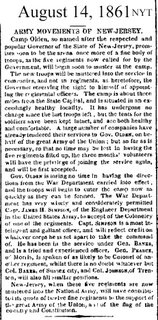 Finding written material on Camp Olden is a challenge. I have been looking through various publications, page by page for quite a number of years. Still looking...
Finding written material on Camp Olden is a challenge. I have been looking through various publications, page by page for quite a number of years. Still looking...The New York Times of August 14, 1861 published this article detailing plans of which officers would be assigned to the troops at the Camp Olden camp grounds in Hamilton.
Joseph H. West's Long Lost "Camp Olden Field" Poem

We've all heard that biblical admonition, "seek and ye shall find." Many years ago, in checking the bibliography of this noted Hamilton historian, I found reference to a little known West work entitled "Camp Olden Field." With my interest in that neighborhood where I grew up, I searched in vain for many years. I finally found a copy which is in very poor shape. It was penned by Joseph West in 1905 for the GAR celbration held here that year. Now that I have found it, I am searching for information on the naming of Hamilton's "Camp Avenue," which just happens to be in the Camp Olden area.
Thursday, December 15, 2005
Bits and Pieces from the Bordentown of 1885
Officer James Meredith Remembers
"A policemen in the olden days in Trenton had some miles to cover to patrol his beat, and we had no automobile patrols either, to help us with drunks when I first became a member of the force 40 years ago.' Thus spoke James Meredith, who is now living with his son, Frank W. Meredith at 1246 South Broad Street. Mr. Meredith was in a reminiscent mood yesterday when a reporter had a chat with him at his home. He continued: 'My, how time is passing. Today there are only a few old timers left who joined the force when I did. Let me see, there was the late Chief, John J. Cleary. He was a patrolman in the third ward. Charley Pilger, now a sergeant of our city detectives, who was a patrolman in the second ward. The late Captain Michael McGowan, of the Central Police Station, and who was known on the police force as the 'Iron Chancellor,' was a patrolman in the old fourth ward, where he always lived, and where he died. Then there was Phil Weigand, who is now living, and retired. Louis Hartman, who was for many years janitor of the 2nd District Police Station, and who is retired, and oh yes, there was Major Hibbs, who is still doing duty as a watchman. The late Charles H. McChesney was our chief of police, and a mighty good one he was, too.
There were just 21 men on the Trenton police force, exclusive of the Borough of Chambersburg, and the bouroughites had a police force with its chief to preserve law and order, and the long beats that we had to cover made a policeman stretch his legs to get over the ground. When I first joined the department, I received $55 a month, and out of that sum $5 a month was deducted each month to pay for our uniforms. Later I got $60 a month, but that was the limit.”
Mr. Meredith made a valuable police officer and did good work in cleaning up the old swamp district which was included in his beat. (Note: The “Swamp”referred to was located between Montgomery and North Broad Streets, near their intersection with Brunswick Avenue.) He has a fine record as a soldier in the Civil War. He was born in Lancaster, Pennsylvania on October 10, 1836, and will be 83 years old next October. He is a member of the Bayard Post Number 8, G.A.R. of this city.
(Note: G.A.R. was the Grand Army of the Republic, a Civil War group.)
Chambersburg Politics and Police 1888
Wednesday, December 14, 2005
Goldberg's and Christmas: Perfect Together
1913 Hopewell Presbyterian Church
Tuesday, December 13, 2005
Trenton's Engine 7
In 1906, a location was sought for the location of Trenton's Engine 7, Trenton Fire house. The site chosen is still occupied by Engine 7 on the corner of Hamilton Avenue and Anderson Street.
Mercer Fire Company - Princeton
Monday, December 12, 2005
Sunday, December 11, 2005
Law and Disorder in the 1870's
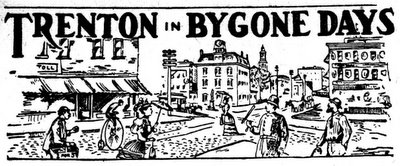
Tom’s note:
This is a transcription from the original column using a process called “OCR,” which stands for optical character recognition. A very small portion has been edited in order to clarify Mr. John Cleary’s references to persons, places and things which today may be confusing to the reader. The original column is in the Hamilton Library’s Local History Collection.
=================================================
Trenton in Bygone Days
Sunday Trenton Times Advertiser
July 14, 1938
An old police docket loaned to Dr. John J. Cleary by descendants of one-time City Marshal John Tyrrell contained many items that bear repetition. Mr. Tyrrell headed the local gendarmerie back in the seventies, long before that office rated the title Chief of Police.
To those f familiar with the quasi-military discipline that now rules our bluecoats, it will come as somewhat of a shock to learn that drunkenness on the force became so much of a public scandal that Mayor John Briest on December 28, 1874, called the members of the department at the City Hall and lectured them on the subject, touching pointedly on the topic of their visits to drinking places while on duty.
Charges of inebriety were frequently made against the boys in blue. One instance records that an officer was found prostrate in the Warren Street Station of the Belvidere Railroad, so outraging the feelings of a sober citizen that he stripped off the patrolman's hat, club and badge and took them to the police station. Putting aside the embroidery of comment, we quote some of the items in the old Tyrrell docket:
Saloonkeeper arrested for selling liquor in smaller measure than a quart on Sunday. Four boys arrested for stealing pears from an orchard, reprimanded and discharged. Baker & Bros. store robbed of $2,000 worth of dry goods. No arrests. City perfectly quiet. Dead horse found lying at the head of Spring Street. Mad dog bit a woman in the Second Ward." .
At 10 P. M. Officer B___, attracted by a horrible stench on Hanover Street, at Warren, caused by night scavenger's leaky carts. Ten men arrested for drunkenness and rioting at ball in Washington Hall, Officers Zerman, Wheatley and Vanderveer making the arrests. All were held for court and Dan Higgins became their bondsman.
"Drunks" of that period were usually conveyed to the station in a wheelbarrow. For instance: Officer King arrested William ("and wheeled him to the City Hall in a barrow: He was fined $3.20 (the regular tariff for that offense.) One chap conveyed to the bastille on a stretcher got 30 days.
A tremendous number of fire alarms, false and real were listed. They kept the volunteers on the hop. Police were often the first on the scene, and the record shows that sometimes they put out the blaze before the firemen arrived. Incendiaries were active. One of their visits touched off the stable of "Curly" Sampson, well known horseman of the time, at South Broad Street and Hamilton Avenue. Two trotting horses were lost in this August, 1873 blaze, and the damage was put at $2,500. The Fashion Stud Farm stables also were leveled at about the same time, also by a firebug who possibly had been wagering on the nags with small success. On September 29, of the same year, Slack's stocking factory. This was one of South Trenton's most important industries located at Warren and Bridge Streets. Four officers were reported for not showing up at the fire. Even the firehouses themselves did not escape. The Harmony stables were the scene of one blaze, but more serious indeed was the conflagration that swept the Eagle stables on June 23, 1874, when four fine horses were destroyed as the building burned to the ground.
A significant quotation: "Alarm of fire last night (June 26, 1874). The cracker bakery of Mr. Pullen in Market Street caught fire from some cause unknown and was totally destroyed. The department got the flames subdued about 4 A. M. All the officers (police) were present except Assistant Marshal Robert M. Parks, who says he heard no alarm."
A few days later a terrific electric storm broke over the city. A bolt struck the very pinnacle of the Third Presbyterian Church steeple. Fuel was added to the blaze by a globe of pitch pine at the crest of the spire.
This elevated torch caused the firemen no end of trouble until finally, after much din of breaking hose lines, the Good Will and Union Companies got it under control. A few years later Fourth of July fireworks ignited the same spire and the resulting flames practically ruined its slender beauty.
April 3, 1875, the wire mill (Trenton Iron Works) was destroyed by flames.
“Sleighing Days Recalled”
Sleighing days are recalled by a note of January 2, 1875:
"the Marshal recovered a buffalo robe and horse blanket belonging to J. Y, Force, all left in the National Hotel stable yard."
One January afternoon 25 citizens were arrested for fast driving, apparently for racing over the snow, as was the custom on the stretch from the canal feeder to Roebling's mill on South Broad Street.
The worst boys of the town were in the gang that once hung around the Taylor Opera House, making life miserable for Special Officer Gandy. They would play all sorts of pranks and pester the patrons as they left the theatres, begging them for the "return" checks. The neighborhood was none too well lighted, and when pursued the lads usually made their getaway, but once in a while the police overhauled them, and the appearance in court of four of them is recorded, with note of their discharge with a reprimand.
It was one of the duties of the police to light and extinguish the city's lamps; one item reporting that "Officer Hartman fell off his ladder while putting out his lamps, strained his ankle and is not fit to report for duty."
Also repeated is the word that "Officer Lane, while in the act of extinguishing one of his lamps, the ladder slipped, fell and broke three of his ribs while in the performance of his duty."
Apparently this simple chore was accompanied by certain danger.
Your Comments Are Welcome
If you have comments I can be reached via email at thomglo@verizon.net, or by phone Monday through Thursday 9:00AM to 12:00 Noon Eastern at 609-581-4060. Comments can also be sent via the www.hamiltonnj.com home page.
Once again, your input is welcome, and thanks for visiting.
Tom Glover



